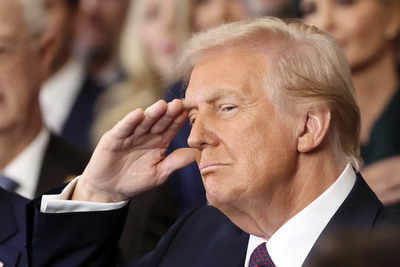
President Donald Trump salutes during the 60th Presidential Inauguration in the Rotunda of the U.S. Capitol in Washington, Monday, Jan. 20, 2025. (Kevin Lamarque/Pool Photo via AP)
President-elect Donald Trump, inaugurated today after his re-election, avoided addressing a significant and contentious topic: the January 6 criminal defendants. In the lead-up to this moment, Trump had repeatedly vowed to pardon many of those convicted in connection with the Capitol riot—a promise that energized his supporters and drew sharp criticism from his opponents. Yet, during his inaugural address, the former president made no mention of his intentions regarding these individuals.
The absence of this issue from Trump’s speech comes as a surprise to many within his base, especially since he previously described the rioters as "patriots" and "political prisoners." Over the past two years, Trump has repeatedly indicated that he would consider broad pardons for those involved in the events of January 6, 2021. His supporters have organized rallies, petitions, and advocacy campaigns urging him to act swiftly upon returning to power. Some of these defendants and their families gathered at watch parties today, hopeful for an announcement that would bring resolution to their legal and personal struggles.
Trump’s silence on the matter has left both his supporters and critics speculating about his next move. While some interpret his omission as a strategic decision to avoid reigniting controversy during an inaugural address aimed at projecting unity and strength, others see it as a potential signal of hesitation or delay. Legal experts have pointed out that while the president has broad powers to grant pardons, such an action in this context would be fraught with political and legal implications.
For the defendants, many of whom are serving prison sentences or awaiting trials, the lack of clarity is frustrating. Groups advocating on their behalf expressed disappointment, with one prominent organizer stating, “These individuals put their lives and freedom on the line because they believed in Trump’s vision for America. Ignoring them now sends a troubling message.”
Opponents of potential pardons, however, view Trump’s restraint as a positive sign. Critics argue that granting pardons to those involved in the Capitol attack would undermine the rule of law and set a dangerous precedent. “The justice system has held these individuals accountable for their actions,” said one legal analyst. “To pardon them would not only excuse their conduct but also encourage similar behavior in the future.”
Despite Trump’s silence during his address, his track record suggests that he may still act on this promise. During his previous term, Trump issued controversial pardons for political allies and high-profile figures, often sparking heated debates about the use of executive clemency. Whether his approach to the
January 6 defendants
will follow a similar pattern remains to be seen.
For now, the question of pardons looms large, adding another layer of uncertainty to a deeply polarized political landscape. As the new administration takes shape, Trump’s supporters will likely continue to push for action, while his critics remain vigilant in opposing any steps that could be seen as condoning the events of January 6. Ultimately, the decision rests solely with Trump, who, as always, seems to relish keeping his next move a mystery.

 1 day ago
6
1 day ago
6










 English (US) ·
English (US) ·